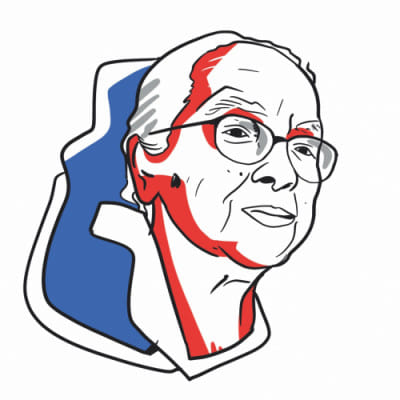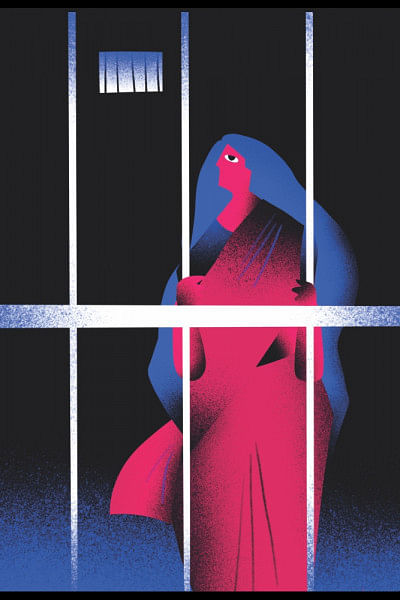Protibha Mutsuddi: An Indomitable Spirit

It was March, 1948. A 13-year-old girl in a remote village in Cox's Bazar would often hear her seniors at school talk about the extent of discrimination the people of East Pakistan faced everywhere. It had only been a year since the partition of undivided India. But the people of East Pakistan were already facing oppression and exploitation in all spheres of their economic and social life. Soon, the girl realised the true nature of West Pakistani rulers when they tried to impose their language on the vast majority of Bengali population in East Pakistan.
On March 21, when Governor General of Pakistan Muhammad Ali Jinnah declared that Urdu alone would be the state language of Pakistan, the people of East Pakistan were enraged and the students of schools, colleges and universities began demonstrating across the country.
As the girl, who would become one of the youngest organisers of the language movement in Chattogram, listened to the heated discussions and people's outrage over the decision, she thought to herself: "It really is unacceptable that East Pakistan's Bangalee people, who constitute 56 percent of the total population, should speak and conduct their official work in Urdu, which is the language of 44 percent of the population."
This young girl, Protibha Mutshuddi, was born on December 16, 1935 in Mohamuni Pahartali village of what is now the Raozan upazila of Chattogram.

When she was an eighth grader at the Mahamuni Anglo Pali High School, revolutionary leader Mahbub Ul Alam Choudhury began to organise students in educational institutions in the district to fight against the communal elements of West Pakistan. Protibha had been given the responsibility to organise the girls at her school and form a Chhatri Shangshad.
That summer, eight farmers were shot dead at the order of a deputy magistrate when they were digging a canal to irrigate their farms in the Madar Shar Tek area of Chattogram. When the news reached Protibha, she ran to her school and told her fellow students that they should protest the killing. Defying the head teacher's orders, the girls then marched into the area. It was the first time Protibha organised and participated in a procession. But she had to pay the price: leave the school.
"A letter was sent to my father from Anglo-Pali Institute telling him not to send me to the school anymore. I was termed a rashtrodrohi [anti statist] in the letter. My father was very angry at me and threatened to stop my schooling and marry me off," says Protibha, now aged 85.
But she was determined to continue her studies. Marriage was something she dreaded, as she often saw women in her village being tortured by their husbands and in-laws. The women had very little schooling, enjoyed almost no decision-making power in their families, and society didn't respect them. To her, marriage meant subjugation. All she wanted to do was study and work to eradicate the discrimination and deprivation of women. Thankfully, she always had her mother's support in what she did. Her mother even told her: "I would be very happy if you do not get married. If I had a chance to study, I would have never gotten married."
So, Protibha studied in the Anglo-Pali High School till grade eight and then went to the Dr. Khastagir Government Girls' High School from where she passed her matriculation exams in 1951. She then got admitted to Chattogram College. Being someone who was very active in the cultural activities of her college, she soon attracted the attention of the legendary cultural activists and leftist political leaders of the city who had a great influence on her life. It was around that time that she met the revolutionary leader Mahbub Ul Alam Choudhury who was famous for his poem "Kaadte ashini, fashir dabi niye eshechhi" (I'm not here to cry, I'm here to demand their execution).
In 1952, when the news reached Chattogram that the Pakistan army had shot at the students who brought out a procession in the Dhaka University campus breaking Section 144, Protibha was a second-year student of the college. By that time, all the schools and colleges of the country had formed Bhasha Shongram committees. Although she was not a member of that committee, she along with other girls of the college brought out a procession. They got on a truck and went to Dr. Khastagir School, Nandankanan School, Kushumkumari School and some other girls' schools and colleges in the city and called on the students to join them, all the while chanting slogans: "Rashtro bhasha Bangla chai / Khuni shorkarer bichar chai" (Bangla must be made state language / The murdering government must be brought to justice).
Protibha Mutsuddi reminisces: "We first went to the Dr. Khastagir School and called the girls to come out of their school and join us. Halima, a resident student of the school, first responded to our call and started chanting slogans from inside the school."
"Jowshan Ara Rahman, who later married Mahbub Ul Alam Choudhury, and her sister Jahanara, who later married Rafiqul Islam (the national professor), were students of tge Dr Khastagir School. They all chanted slogans from their schools."
In 1954, Protibha attended a cultural conference held in Curzon Hall as a student representative of Chattogram College. Similar conferences had also been organised in Comilla and Chattogram through which the people of East Pakistan raised their demand of making Bangla one of the state languages of Pakistan. When she returned to Chattogram after attending the conference in Dhaka, she told her father that she would like to study in Dhaka University and got her father's consent.
So, in 1954, Protibha got admitted to the economics department of the university and got a seat at the Dhaka University Women Students' Residence, popularly known as Chameli House, where female students from the minority communities used to live. The same year, she joined the Chhatra Union and became actively involved with student politics and the language movement.
In 1954, she was elected the common room secretary of Dhaka University Central Students' Union (DUCSU), a prestigious position at that time, and was elected the vice president of the first women's hall of the university in 1956.
In 1955, she was arrested from the campus and sent to the central jail. "On the morning of February 21, 1955, when we were studying at our hostel for our subsidiary exams, we heard that the police had barricaded the Arts Building and also arrested some female students of Dhaka Medical College and Salimullah Medical College," she remembers. "On that day a meeting was supposed to be held in Amtola. We (Kamrunnahar Laily, Farida, and I, along with some other students) immediately left our hostel and went to the Arts Building and saw that police had taken position on both sides of the road."
"In Amtola, a student was addressing the public when suddenly the police attacked the students and dispersed the crowd. Like others we also managed to flee, and the seven of us took shelter in the university library. When it became dark outside, we thought we could leave now. Getting out, we saw a police van patrolling in the area. When they told us to get on that van, we started chanting slogans: "Amader dabi mante hobey / rashtro bhasha Bangla chai" (Our demand
must be met / Bangla must be made state language). At this, other students also came out chanting slogans."
The police arrested 29 female students and hundreds of male students that day and took them first to the Lalbagh thana and then to the central jail.
"Hosne Ara, Laila Nur, Taleya Rahman were with us in jail. During that time, Ila Mitra and Momotaj Begum were also in the jail.
They sent us a message through other inmates that we should demand newspapers and better meals," recalls Protibha.
"There was a small yard in the jail where we would be brought in the morning and would be taken back to our cells in the evening. We used to sing and chant slogans all the time:
"Bicharpoti tomar bichar korbey jara/
Aaj jegechhey ei janata"
(Judge, the masses that will judge you have now risen)
"Jago onoshon bondi utho re joto/
Jogoter lanchhito, bhagyohoto"
(Rise, O those on hunger strike, rise all you oppressed and hapless)
"Karar oi louha kopat/
Bhenge phel korre lopat"
(Break the prison door, slam it to the ground)
Protibha was released from jail two weeks later.
During her university life, Protibha came in close contact with many legendary political and cultural personalities, including Sufia Kamal and Zahir Raihan. She also had the opportunity to meet Maulana Bhashani in person and take political lessons from him. Maulana Bhashani used to invite the student leaders to the Burdwan House (now Bangla Academy) and encourage them to unite against the oppression of the Pakistani regime and fight for Bangla language. "When Maulana Bhashani formed the National Awami Party (NAP) in 1957, we went to the Rupmahal Cinema Hall and listened to his speech."
Protibha, a Buddhist by religion, believes in the coexistence of all religions and always advocates for religious harmony and tolerance. In 1957, when she was invited by the British Council to give a speech on Hazrat Umar, one of the four caliphates of Islam, on the occasion Umar Day, she accepted the invitation without any hesitation. The criticism and opposition from her fellow comrades of Chhatra Union could not stop her. She spoke about Hazrat Umar's administrative skills, his love for his people, and how he meted out justice to the oppressed population. She was widely praised for her speech.
In her early career, she worked as a teacher at some remote schools of the country and then joined Bharateswari Homes (established by Ranada Prashad Saha) in 1963 as a professor of economics. In 1965, she became the acting principal of the college and then worked as its principal from 1967 to 1999. She also worked as a director of the Kumudini Trust. She believes she could make at least some impact on the lives of the underprivileged girls and women through her work in the Bharateswari Homes and Kumudini Trust. Now, in her mid-80s, Protibha Mutsuddi is one of the directors of the Kumudini Trust and the local administrator of the Kumudini Trust in Mirzapur, Tangail.
Protibha is hopeful about the progress the country has made in terms of women's empowerment and girls' education. But being a language movement veteran, she laments, "Why is it that Bangla is still not used at all levels of the state? The language of the court is still English, our signs and signboards are in English, many of our textbooks at the advanced level are only available in English. So many countries prioritise their mother tongue—why, then, can we not do the same, when we have sacrificed lives for our language?"

 For all latest news, follow The Daily Star's Google News channel.
For all latest news, follow The Daily Star's Google News channel. 



Comments